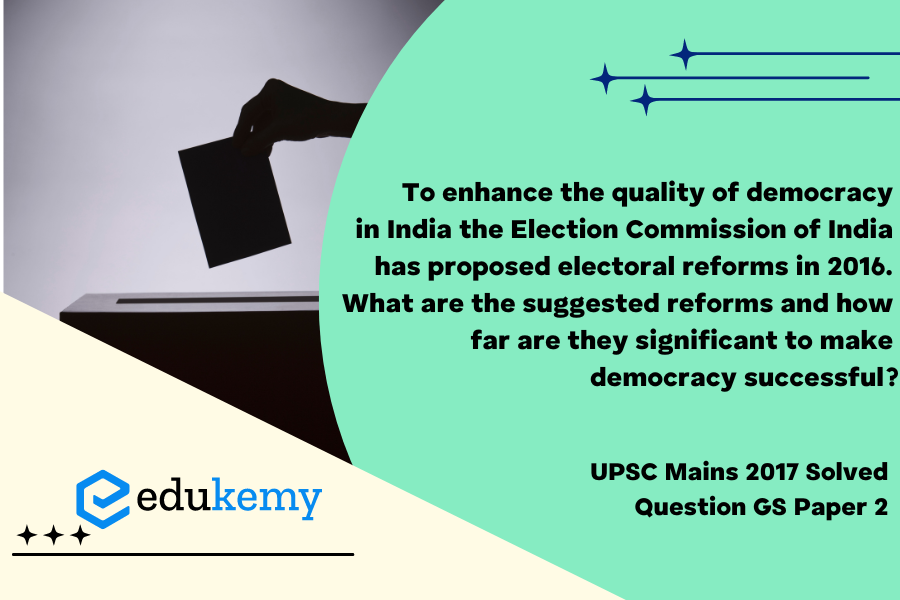In 2016, the Election Commission of India, recognizing the imperative of enhancing the quality of democracy, proposed a series of electoral reforms aimed at fortifying the democratic framework of the country. These suggested reforms encompassed a wide spectrum of electoral processes, seeking to address various challenges and loopholes prevalent in the existing system. One of the key proposals included the introduction of stricter regulations on political funding to ensure transparency and curb the influence of money in politics. Additionally, the Election Commission advocated for the implementation of electronic voting machines (EVMs) with paper trails to enhance the credibility and integrity of the electoral process. The proposed reforms also delved into the issue of criminalization in politics, urging for stringent measures to disqualify candidates facing serious criminal charges.
Tag: Indian constitution.
Contents
Decoding the Question:
- In Introduction, try to briefly write about the Election Commission of India and background for proposals.
- In Body,
- Write various reforms proposed by the Election Commission of India in 2016.
- Also, mention the significance of these reforms.
- In Conclusion, try to write about the need for such an electoral reform.
Answer:
The Election Commission of India (ECI) was established in 1950, under the Article 324 of the Constitution. It is a permanent independent constitutional body vested with the powers of superintendence, direction, and control of elections. To cleanse the political funding and decriminalize politics, ECI is working towards a comprehensive review of the election laws.
Proposed Reforms of ECI:
- Constitutional protection for all members of the election commission of India:ECI suggested that other election commissioners should also be protected in the same manner as Chief Election Commissioner is protected under clause (5) of Article 324.
- Budget of the commission to be ‘charged’:Presently, the administrative expenditure of the Commission is a voted expenditure. The Commission sent a proposal that the expenditure of the Commission should be charged/ non-votable expenditure on the Consolidated Fund of India similar to other constitutional bodies.
- Independent Secretariat:The Commission proposes that it should have an independent Secretariat along the lines of the Lok Sabha, Rajya Sabha and Registries of the Supreme Court and High Courts.
- Proxy voting:Section 60 of The Representation of the People Act, 1951 should be amended to provide overseas electors the alternative option of proxy voting or postal ballot voting.
- The Commission proposes that making any false statement or declaration before the Election Commission should be an electoral offense.
- The Commission has proposed amendments and suggested dividing the seats in the Council of States and State Legislative Councils into three categories and specifying the term for each category in such a way that biennial retirement of 1/3rd of the members would be ensured.
- Use of totalizer for counting of votes:EVM totalizer can count votes of multiple Electronic Voting Machines (EVMs) simultaneously. This way the results of votes in a group of EVMs can be taken without ascertaining the result in individual EVM corresponding to polling booths.
- Persons charged with cognizable offenses shall be debarred from contesting in the elections, at the stage when the charges are framed by the competent court provided the offense is punishable by imprisonment of at least 5 years, and the case is filed at least 6 months prior to the election in question.

Significance of these Reforms:
- Politics in India was once a moral act, but today it is scarred by corruption. The elections in India are vulnerable to the adverse influence of three ‘M’s: money, muscle and media (including the social media).
- In the absence of signs of credibility or trustworthiness from candidates, voters often make choices based on caste, muscle power or charisma to get things done.
- Around 82% of all Lok Sabha members are crorepatis, who have declared wealth of more than Rs. one crore. Their numbers have gone up from 156 to 315 to 449 in the last three Lok Sabhas.
- The proportion of MPs with criminal cases has been going up steadily, from 12% to 15% to 21%, since 2004. Many cases are for heinous crimes like rape, murder, kidnapping and extortion.
- To make the process more transparent, disqualify criminal elements, mandate greater disclosure of money power, forge inner-party democracy and raise voter participation, the recommendations of ECI are crucial.
The quality of a democracy can be seen through its electoral process. It forms the bedrock of all rights available to the citizens of the country. The Election Commission is the watchdog of the Indian electoral system and its suggestions can help build a transparent, efficient, and inclusive election system, so that the people may feel sovereign in the true sense.
In case you still have your doubts, contact us on 9811333901.
For UPSC Prelims Resources, Click here
For Daily Updates and Study Material:
Join our Telegram Channel – Edukemy for IAS
- 1. Learn through Videos – here
- 2. Be Exam Ready by Practicing Daily MCQs – here
- 3. Daily Newsletter – Get all your Current Affairs Covered – here
- 4. Mains Answer Writing Practice – here


